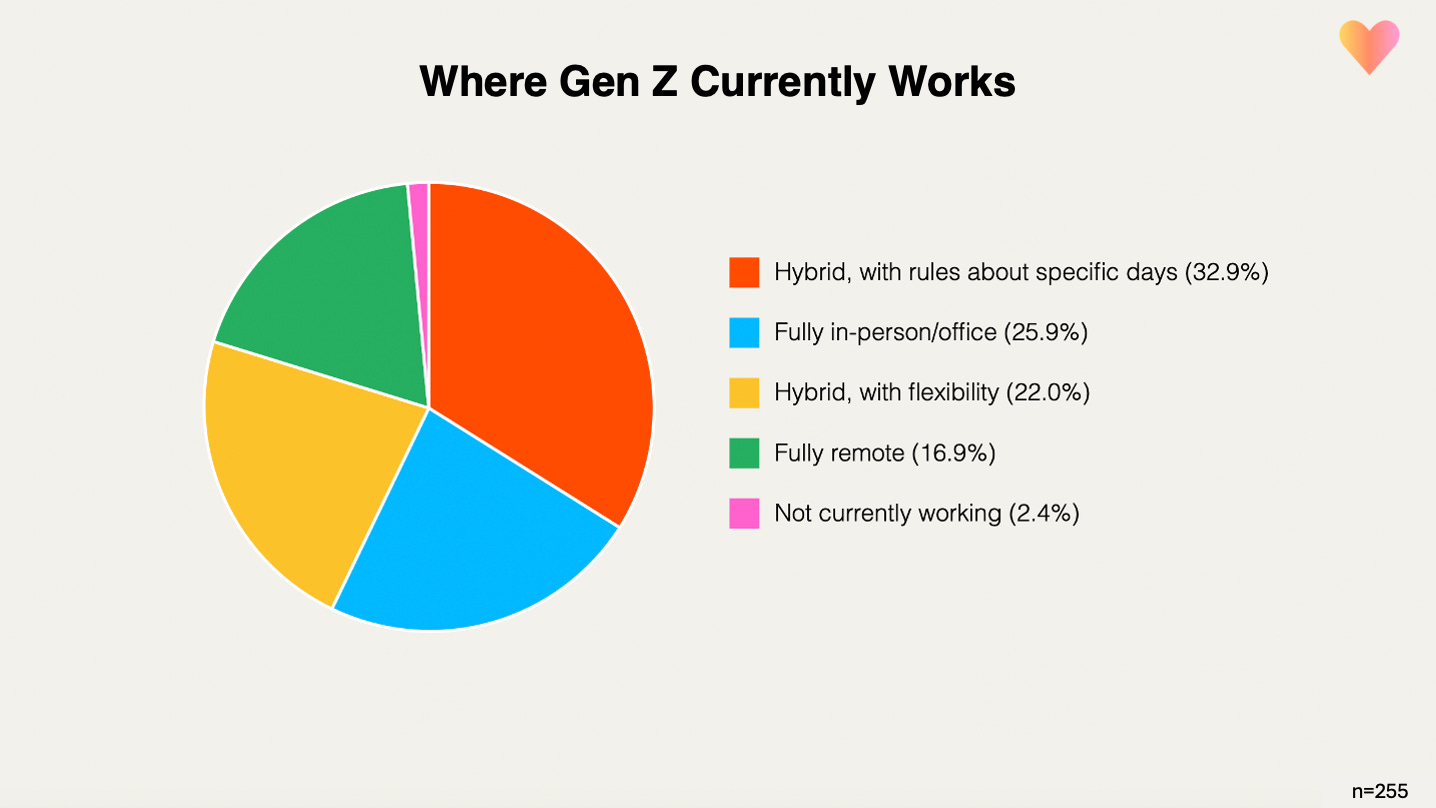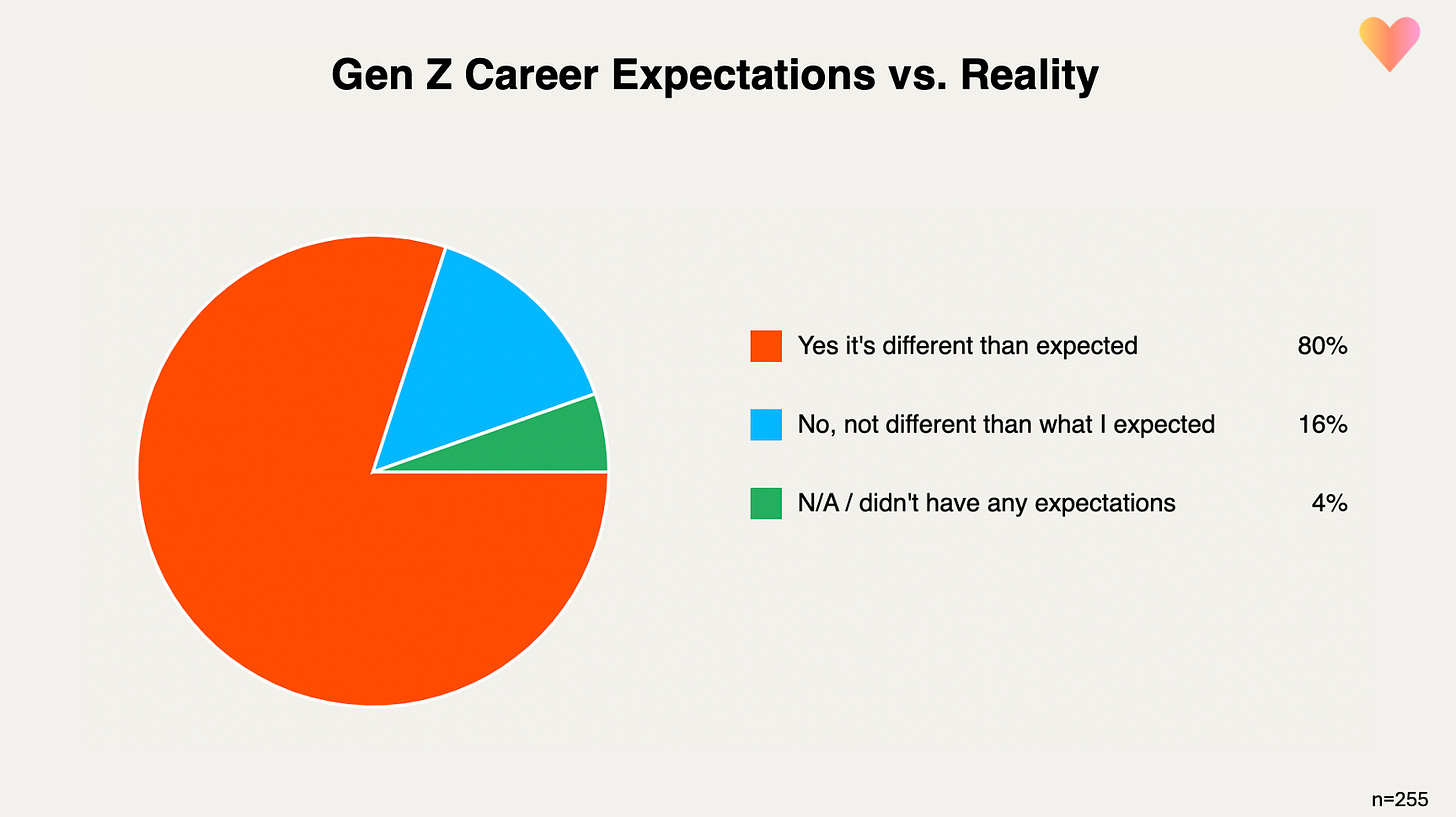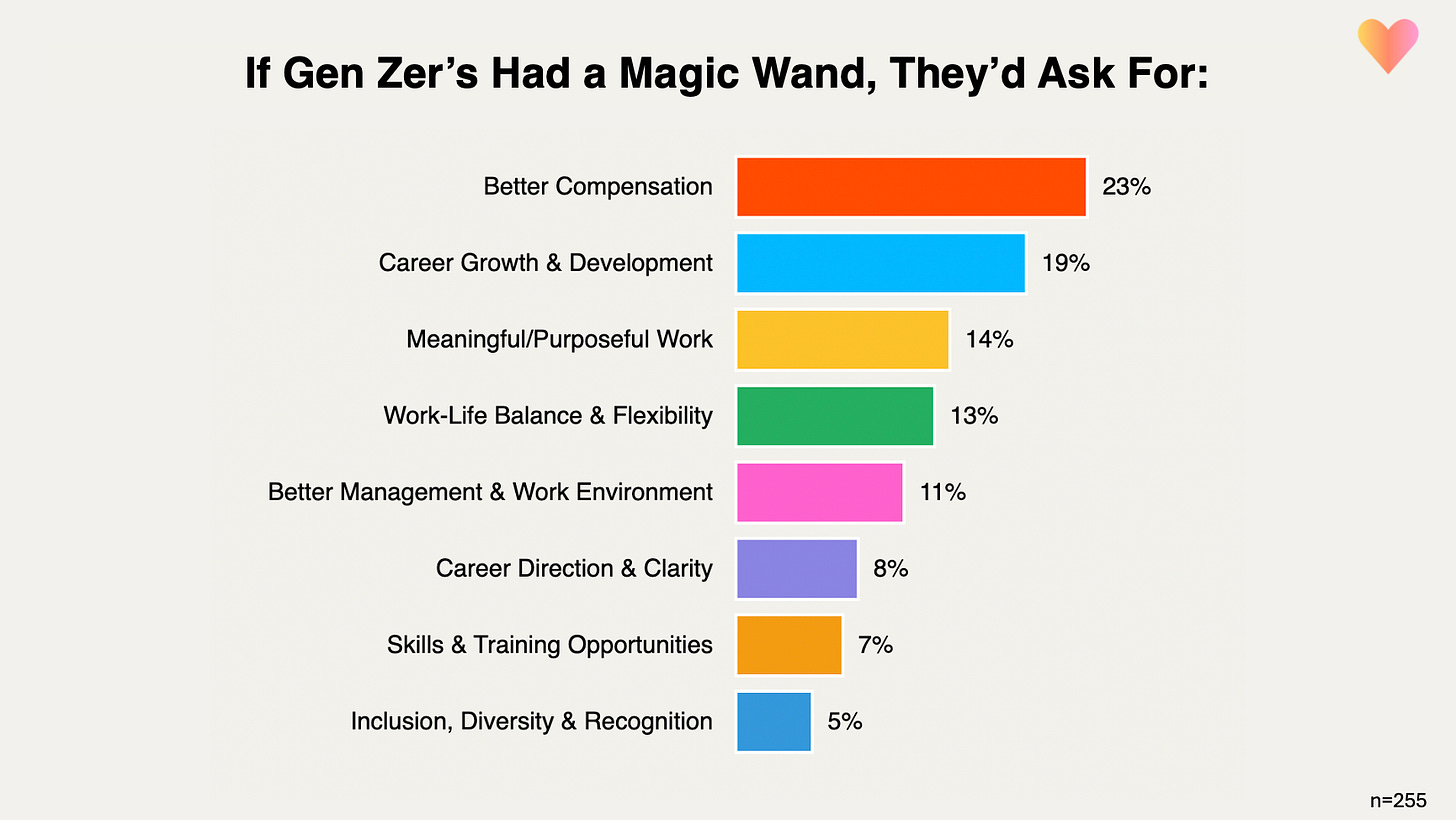Gen Z Isn't Drinking the Kool-Aid
255 of them from 28 industries and 21 countries told us why.
In March,
and I dropped a survey on Substack to figure out how Gen Z feels about work. There’s a lot of noise out there accusing Gen Z of being lazy, and as Gen Zers ourselves, we didn’t think that was the case.Gen Zers from around the globe opened up about their thoughts on work-from-home, what their salaries look like, and what keeps them up at night when it comes to their careers. Synthesizing the responses that came in from across 28+ industries was genuinely so fun for me to do. No matter location or role, this generation is talented, skeptical, setting boundaries, anti-exploitation, and funny as hell about it.
If you’re Gen Z, I hope these insights make you feel less alone in what you might be going through with your career. And if you’re an employer, listen up; you’ve got some work to do if you plan on earning an ounce of loyalty to keep Gen Z around.
255 Gen Zers across 21 countries who graduated from undergrad between 2019 and 2024 responded to the survey.
Contrary to popular belief, most Gen Zers aren’t working from home in sweats.
Over half of Gen Zers are tied to strict work setups, with only 22% having real hybrid flexibility and 16.9% being fully remote. But if given the choice, 83% of Gen Zers would take a hybrid setup because it’s the best of both worlds.
A balance between in-person, surrounded by colleagues and leaders, and at-home, accessible to quick errands, workouts, and cooking is the dream — striking the balance between physical & mental health and socialization. An attorney in New York said, “I think going into the office has helped me make friends! The remote option (2 days a week) has also helped me have more flexibility to do errands, cook, go to the gym, etc.”
A customer care team lead in Riga, Latvia said, “Office has its perks, but it is also super loud, meeting amount is insane on the office days, it is very difficult to focus and finish tasks. I have realized I am not as extroverted as I thought, as I enjoy 100x more working from home, alone, in silence…”.
Remote work feels isolating and detrimental to their social and professional lives.
A communications coordinator in Regina, Canada said, “the isolation, both personal and professional, felt horrendous. I felt like I couldn't access the supports I needed to learn how to my job properly and didn't have established social relationships with my coworkers to help cope. I think my job performance suffered (and still suffers) as a result of onboarding remotely.” and a program coordinator in Gaithersburg, Maryland said “I was cooped up in my room all day with little social interaction with people outside my family. It was also harder to stay focused bc my work space and rest space were kinda blurred together.”
And fully in-person workers are desperately craving a WFH day.
A PR intern & circulation library assistant in New Jersey said, “…my commute is around 1.5 hours each way by train, so it definitely does tire me out more and leave less time for fun / social plans on days when I go in office.” and a facilities coordinator in New York said, “The flexibility to wfh and go visit family or even have a maintenance guy come over to my apartment would be huge. Those things are impossible to coordinate when I'm in office during working hours all week.”
Hybrid work provides the exact balance this generation craves.
Having both WFH days and in-office days enables better relationships with their teams, but also the “flexibility to get my daily life shit handled” (via a manager in Colorado). They can get their socializing and mentorship IRL, but they’ve got the ability to maintain other aspects of their life when working remotely on certain days as well. But don’t take working remotely as not working — they’re getting their work done no matter where they are. They’re just working smarter, not harder — something they think previous generations might’ve not always done.
Depending on your work setting preference, some industries are more consistent than others on where they want you seated. Our most hybrid-friendly industry was accounting & finance, while in-person is 100% dominated by construction/real estate. Fully-remote industries had significantly smaller offerings, with the highest remote-friendly industry being IT & software, but only at 35%.
Only 1 in 4 Gen Zers are committed to their current role for the foreseeable future.
But godspeed if you’re looking for a new gig because it’s rough out there. While compensation matters, the structural issues of mismatched experience requirements and an increasingly competitive market present the most significant barriers for Gen Z job seekers.
But as Gen Z is looking, you can bet they’re focused on one thing more than the others: work-life balance. (This is the point in my research where I have some opinions, but have to omit them and be unbiased. I will gladly share them with anyone who wants to hear in comments/DMs.)
75.9% of respondents said that work-life balance matters the most.
Gen Z believes working for their paycheck allows them to do the things they want to do and be the person they want to be. They take pride in what they do (for the most part), but it’s not the most important thing in their life.
Don’t get it twisted though — cash is still very much king.
When asked what would get Gen Z to stick around with their current employer, the #1 request was more money.
Above work-life balance and in addition to more money, Gen Z will only stick around if there’s a good culture, strong benefits, and a path to grow. Loyalty from Gen Z is nowhere to be found if most of these things are missing. Employers, did you hear that?
“*Kim Kardashian voice* Employers need to get their asses up and actually train their employees. It's like nobody wants to train and nurture their employees anymore.” - Unemployed Gen Zer in Memphis, TN
Speaking of money, 84.5% of Gen Z makes less than $100k annually.
Only 15.5% are bringing home six figures — and that’s mostly U.S.-based. No Gen Zers outside of the U.S. are making more than $125k.
80% of Gen Zers are experiencing a career much different than what they expected.
A production coordinator/audio producer in New York said, “I did not expect so many of my talented friends to be unemployed.”
They did what they were told to do: went to college, got the degree, did the internships. But they’re feeling like the saying “hard work pays off” doesn’t apply like it used to. It’s no longer about working hard or taking the traditional route that worked for previous generations. A director of digital marketing in Oklahoma City, Oklahoma said it best: “You can check all the boxes, do everything right, and you’ll still get underpaid and overworked by an employer… the current job market makes me feel like my experience and effort has no value.”
Gen Z is also brutally aware of job instability, and they’re on their toes at all times, viewing work as a paycheck, not a promise.
Experiencing layoffs themselves or watching others around them go through the process makes them feel disposable to employers. They’re not willing to go above and beyond for employers that wouldn’t care if they lived or died.
A legal associate in Washington, D.C. said, “Why should I sacrifice my well-being, my delightful and singular existence, for a company that does not care if I sleep 7 hours a night or have the time to call my mom or feel the sun on my face?”
They feel more nimble and flexible than previous generations because all they’ve seen since graduating is a lack of stability. They aren’t getting comfy and are always ready to pivot.
For employers wondering how in the world they’re going to retain this generation, it’s really not that complicated. If you can’t offer golden handcuffs, you need to pull out some other stops, like a salary raise and some mentorship/career guidance. It will make you much more appealing to this generation, because based on the data, it doesn’t seem like very many are delivering on these things at the moment.
Based on these findings, here are my tips for Gen Zers and employers.
If you want to stay sane when it comes to your career:
Treat your job like a contract, not a calling. It’s a job after all. Show up and do great work, but don’t let it harm your mental/physical health.
Advocate for yourself. Closed mouths don’t get fed. Read that again. Ask for that raise, push for clarity, and don’t shrink your needs. All of my best promotions and raises came from me asking for them, not getting them handed to me.
Have an exit plan (even if you love your job). Things can change fast – keep the resume updated and always be open to new opportunities.
Redefine what success means to you. Maybe it's remote flexibility. Maybe it's $75K and peace. Maybe it's quitting to freelance. Define your priorities.
If you’re looking for a new job…
Don’t bank on the ATS. Build connections with people IRL. It will get you so much further than a poorly designed digital application system.
Explore different job boards. Many Substackers I follow have (or used to have) job boards or occasional posts showcasing cool-looking gigs that you probably won’t find on LinkedIn. Check out
, , and .
And for my employers, here’s how to retain Gen Z talent in 2025:
Earn your loyalty. If you’re not handing out a pension, you need to hand out good pay, benefits, culture, and growth opportunities.
Respect boundaries or expect turnover. Show them you care about their life outside of work, or they’ll find another job that does.
Be in their corner. You don’t need to hold their hand, but mentorship and guidance are helpful in this early career stage.
Support side hustles. They’re not cheating on you, they’re leaning into financial safety nets and creative outlets. Encourage entrepreneurial energy, and you might retain them.
If you’re Gen Z, do you relate? If you’re from another generation, what are your thoughts? If you’re an employer, what do you have to say for yourself? Sound off in the comments.
















I love this line - I'll be using this one in future conversations. "Closed mouths don’t get fed." Thank you for sharing these Gen Z insights.
This is brilliant and very in line with what I talk about as well. The kids are alright! They just want to be paid and be able to have a healthy personal life… as they should. Thanks for this.